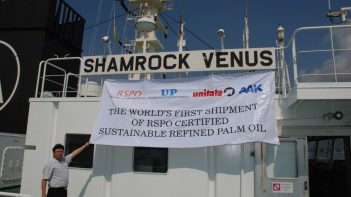Jakarta, 12 December 2017: A report titled Managing Palm Oil Risks: A brief for financiers launched today by the Roundtable on Sustainable Palm Oil (RSPO) and Landscape Indonesia highlights that Indonesian financial institutions are facing increasing reputational, regulatory, and financial risks by funding unsustainable palm oil producers.
The report traces the routes by which unsustainable palm oil practices may translate into increasing risks for the banks and investors financing them. It sets out a clear way forward for banks wishing to take the bold step to transition their current palm oil portfolio towards one that is more supportive of sustainable economic development in Indonesia.
“The environment in which Indonesia’s palm oil sector operates is changing. Major stakeholders, including governments and refineries, are taking measures to manage sustainability issues, and these are creating clear risks for banks who have unsustainable producers in their portfolios,” said Agus Sari, CEO of Landscape Indonesia and senior associate at the World Agroforestry Centre (ICRAF), as one of the authors of the report. Other co-authors are Jan Willem van Gelder of Profundo and Pablo Pacheco of the Center for International Forestry Research (CIFOR).
Many stakeholders are taking steps to tackle sustainability issues associated with palm oil expansion, including deforestation, peatland destruction, and forest fires, as well as land conflicts with local communities, labour issues, and corruption and tax avoidance. For example, after the devastating forest fires in 2015, the Indonesian government issued policies prohibiting the development on peat areas and limiting further expansion of palm oil. Data quoted in the report shows that the present market and regulatory circumstances could mean that 75 percent of land which had been reserved for future expansion of oil palm plantations cannot be developed on.
Such restrictions on producers could translate into risks for the banks financing them, as the value of collateral taken for loans predating these developments has fallen. Stricter requirements from global buyers, who are committed to source only sustainable palm oil, would mean that non-compliant palm oil producers may lose contracts, which could result in lower revenue and profits.
Additionally, the banks financing unsustainable palm oil producers face serious reputational risks. As civil society’s ability to monitor how a company’s contribution to environmental and social damages increases, a bank’s reputation can be compromised if any of their clients is found to be in breach of their sustainability requirements and this information is made public.
A new regulation issued by Indonesia’s Financial Services Authority (Otoritas Jasa Keuangan, OJK) in July 2017 outlines that banks are required to report on sustainability and to have a sustainable finance action plan. The regulation specifies penalties for non-compliance and builds on the OJK’s 2014 vision that the finance sector should push for sustainable development in Indonesia.
“Banks have played an important role in the steep growth of the palm oil sector thus far, and can also have a positive impact on future growth. Financial institutions, including banks through its financing decisions, can encourage companies to meet their social and environmental responsibilities. At the same time, business decisions that incorporate sustainability concerns will create stability and prosperity for the bank by limiting risk exposure,” said Tiur Rumondang, Country Director for RSPO operations in Indonesia.
Managing Palm Oil Risks: A brief for financiers sets out 11 clear steps for banks to consider should they choose to incorporate sustainability concerns into their palm oil portfolio. Defining an overall sustainability vision and a palm oil sector policy, reviewing portfolios and engaging with clients on sustainability are initial recommended actions. Plans for improvement can then be agreed upon with clients, perhaps with incentives such as lower interest rates, while monitoring, reporting, reviewing, and participating in multi-stakeholder forums remain crucial. It is time for the Indonesian financial sector to join the growing ranks of those heading towards sustainability and secure for itself a stable and prosperous future.
Keep reading
Call for Proposal: Study on Wild Palms in West and Central Africa

RSPO hosts first Africa downstream sustainable palm oil supply chain forum in Cape Town

Nearly two decades on, Europe continues to drive global demand for RSPO Certified Palm Oil

Communicating Sustainable Palm Oil - examples of success across Europe
[EOT] Terms of Reference: Independent Smallholders Outreach Programme in Indonesia

RT2023 Delegates Propose Solutions to Reinforce RSPO’s Assurance System – End-Year Highlights of Assurance Standing Committee
RSPO UK Members' Day Examines Shifting Dynamics of Doing Business within Europe

Celebrating 20 Years of RSPO’s Sustainability Journey




